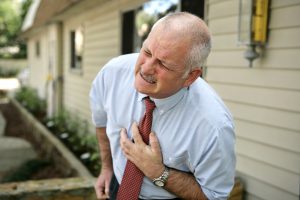
A heart attack occurs when there is not enough oxygenated blood flowing to the heart. If blood flow is not restored quickly, the heart muscle begins to die. Treatment started at the first sign of a heart attack can improve outcomes, but if these symptoms are overlooked then the risk of death increases.
Signs and symptoms of a heart attack
Chest pain: Chest pain is the most commonly recognized symptom indicating that there is something wrong with the heart. But for some patients, chest pain does not occur as a symptom of heart attack. You may experience pressure, tightness, or pain originating in the center of the chest spreading down the arm, to the back, or to the neck and jaw (we will explain this symptom further down).
Unusual fatigue: We all get tired from time to time, but if fatigue is new, sudden, or dramatic, it could be a sign of a heart attack. This includes suddenly feeling worn out after your typical exercise routine, feeling fatigued even without physical exertion or after simple activities like making the bed, and experiencing sleep disturbances even though you feel exceptionally tired.
Sweating and/or shortness of breath: If you experience sudden sweating or shortness of breath without physical activity, breathlessness that worsens without activity, shortness of breath that worsens when lying down and improving when getting up, stress sweat with no apparent stress, or sweating or shortness of breath that is accompanied by the other symptoms listed here, then these are signs of a heart attack.
Neck, jaw, and head ache: As mentioned, chest pains can move to affect the neck or jaw, but pain in the jaw or neck can occur without the presence of chest pain during a heart attack.
Nausea: Women are more likely than men to report nausea as a symptom of a heart attack. It may also be accompanied by indigestion symptoms or frequent belching. Some patients have even described feeling as if they have a flu leading up to a heart attack. If nausea or indigestion is sudden with no apparent cause, this could be related to a heart attack.
Upper middle abdomen discomfort: In some patients, pain experienced in a heart attack may feel like upper middle abdomen pain. You may experience heaviness or a sharp pain that is temporary or persistent.
Heartburn: Once again, heartburn, or indigestion, can be a common symptom related to a heart attack. This is similar to upper middle abdomen discomfort.
Arm pain: As mentioned, arm pain may follow chest pain. Arm pain may occur in both arms, but it is most commonly experienced in the left arm.
Upper back pain: Pain from the chest may radiate to the upper back and can be experienced in-between the shoulder blades.
Lightheadedness: Women often report lightheadedness or dizziness more often than men when experiencing a heart attack. They may feel as if they are about to pass out and have difficulties exerting themselves or even moving.
Heart palpitations: The heart may feel as if it is skipping a beat, the rhythm has changed, or that the heart is pounding or throbbing.
Vomiting: After the feeling of indigestion or nausea, some patients may experience vomiting. If this is not caused by something you ate, it could be tied to an impending heart attack.
No symptoms: Roughly one-quarter of heart attacks do no present any symptoms. This is known as silent heart attack. This type of heart attack is most common among diabetics. In this case, it’s important to recognize any changes, no matter how slight they may be.
As you can see, there is a variety of symptoms associated with heart attack. The sooner you recognize the symptoms of a heart attack, the quicker you can seek out medical attention and thus save your life.
Related: Mild heart attack: Symptoms, treatment, and precautions